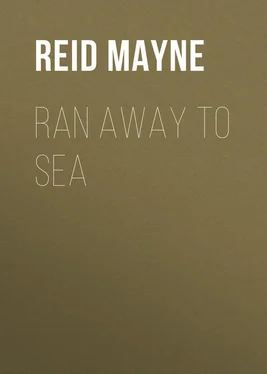Mayne Reid - Ran Away to Sea
Здесь есть возможность читать онлайн «Mayne Reid - Ran Away to Sea» — ознакомительный отрывок электронной книги совершенно бесплатно, а после прочтения отрывка купить полную версию. В некоторых случаях можно слушать аудио, скачать через торрент в формате fb2 и присутствует краткое содержание. Жанр: literature_19, foreign_antique, foreign_prose, foreign_children, на английском языке. Описание произведения, (предисловие) а так же отзывы посетителей доступны на портале библиотеки ЛибКат.
- Название:Ran Away to Sea
- Автор:
- Жанр:
- Год:неизвестен
- ISBN:нет данных
- Рейтинг книги:4 / 5. Голосов: 1
-
Избранное:Добавить в избранное
- Отзывы:
-
Ваша оценка:
- 80
- 1
- 2
- 3
- 4
- 5
Ran Away to Sea: краткое содержание, описание и аннотация
Предлагаем к чтению аннотацию, описание, краткое содержание или предисловие (зависит от того, что написал сам автор книги «Ran Away to Sea»). Если вы не нашли необходимую информацию о книге — напишите в комментариях, мы постараемся отыскать её.
Ran Away to Sea — читать онлайн ознакомительный отрывок
Ниже представлен текст книги, разбитый по страницам. Система сохранения места последней прочитанной страницы, позволяет с удобством читать онлайн бесплатно книгу «Ran Away to Sea», без необходимости каждый раз заново искать на чём Вы остановились. Поставьте закладку, и сможете в любой момент перейти на страницу, на которой закончили чтение.
Интервал:
Закладка:
It was hardly probable that the cutter was a pirate; though, had it been upon a different part of the ocean it would have been probable enough, for at that time pirates were by no means as scarce as they are at present. But it was not a favourite locality with pirates. The merchant-craft that traded along this part of the coast were usually small vessels with insignificant cargoes, and, when outward bound, carried only such bulky articles as salt, iron, and rum, with toys and trinkets; which, though sufficiently attractive to the black savages of Dahomey and Ashantee, were not the sort of merchandise that pirates cared to pick up. They were sometimes more richly freighted in their homeward trip, with gold-dust and elephants’ teeth, and pirates could find a market for these. There were still some of these freebooters upon the African coast, for there they could find many a secure rendezvous, but they were never so numerous there as in the West Indies and elsewhere. Had the cutter been met with at an earlier period – that is, while we were further out on the Atlantic, and upon the track of the Cape traders and Indiamen – then the people of the Pandora might have taken her for a pirate, and very probably would have taken less trouble to get out of her way – for these gentry were far less afraid of a pirate than of an honest warship. They knew that the pirates looked upon traders of their kind as kindred spirits – almost birds of the same feather; and that, therefore, they would have but little to fear from their brother outlaws. They knew, moreover, that they had nothing to lose but a few casks of brandy and rum; the iron, salt, and toys which formed the remainder of the Pandora’s cargo, being goods that a pirate would not be bothered with. The brandy and rum would be all he would be likely to rob them of, and of these there were only some half-dozen puncheons – for I had ascertained that most of the great casks in the hold were water-butts filled with water, and of course intended to supply the living cargo on their voyage across the Atlantic.
A pirate, therefore, reasoned the crew of the Pandora , would only rob them of their six puncheons of spirits, and that would be all. Perhaps he might take a fancy to the fine barque, and insist on pressing some of them into his service. That would be a misfortune to the owners; but, as for the crew themselves, I was under the belief that very few of them would have required “pressing.” Most of them would have been willing enough to take a hand at buccaneering, or any other sort of villainy.
As the cutter drew near, however – for she was drawing near – it became evident she was no pirate. Indeed, she made no secret of what she was, for the British flag was run out to her peak, at once proclaiming her a British vessel of war. It is true a pirate might have used that signal for a decoy; but, considering the time and place, it was not likely, and the Pandora’s people did not entertain the thought of its being one. The cutter was a British cruiser beyond doubt. That was their full belief and conviction.
No flag could have been more unwelcome to the eyes of the slaver’s crew than the one now spread to the breeze from the peak of the cutter’s main-sail. Had it been the Portuguese ensign, or the Spanish, or even the French, they would have dreaded it less; for, notwithstanding the promises of these nations to aid in putting a stop to the slave-trade, it is well-known that they have acted with great lukewarmness in the matter. Indeed, worse than that – since the governors of their Transatlantic possessions – even the captains of their ships of war – have been known, not only to connive at the slave-traffic, but actually to assist in carrying it on! Had it been a ship of one of these nations the Pandora would have been less desirous of escaping from her. She would have been brought-to, perhaps; and after a slight examination – with a word or two of secret intelligence between her captain and the commander of the war-vessel – allowed to go about her business; and this would have ended the affair. But no such an easy congé would be given by the commandant of a British cutter; for, to the honour of the British officers be it said, that in all such cases they have performed their duty, and carried out with energy the designs of their government.
The crew of the barque, therefore, on perceiving that it was in reality a British cruiser that was in the wake, were put into the greatest confusion and trouble. I say in the wake, for long since the Pandora had turned stern towards the strange vessel, and was making all sail to escape.
It was evident that the cutter was a fast sailer, and knew it – else she would have used more strategy in making her first approach. On the contrary, she had taken no pains whatever to conceal her character; but, setting her head right for the Pandora , had given chase at once. The barque had been equally prompt in showing her stern; and for some hours a regular tail-on-end run was kept up between the two vessels.
Chapter Twelve
For my part, I awaited the result with the deepest interest. I watched the two ships as they sped; and, with my eye, kept constantly measuring the sea between them. My heart was full of hope, and beat joyfully as I observed that the distance was gradually decreasing, and the cutter each minute seemed larger upon the waves.
There was but one drawback to the exultation which I felt – and that was a serious one. Brace had confessed to me that he was a deserter from the Royal Navy. If taken he might be recognised. The stripes upon his back would lead to suspicion – for there are brands almost peculiar to the navy – proofs of his desertion would be sought – perhaps easily obtained, and then I knew the terrible punishment he would have to undergo. For my own sake I wished the cutter to capture us. For the sake of my friend – the preserver of my life – I wanted the Pandora to escape. I wavered between two hopes – now my own horrid situation was before me – the disgust I felt for the life I was compelled to lead, the hopelessness of getting away from it; and when these thoughts came into my mind I looked with longing eyes towards the pursuer, and wished her nearer and nearer. Then my eyes would rest upon poor Brace, as he hurried over the decks – Using all his efforts to aid the Pandora’s speed – my thoughts would undergo a complete revulsion, and my late hopes would suddenly change into fears. For a long while I awaited the result, with this singular alternation of contradictory emotions.
During all this time there was a stiff breeze blowing, and this it was that gave the cutter the advantage. As already intimated to me by Brace the barque was a “crank” vessel, and carried sail badly under a wind; though, in fair weather, or with a light breeze, she was one of the fastest sailers on the sea. It was for this quality she had been chosen for the peculiar trade in which she was employed – for swiftness, not stowage, are the points of advantage in a slave-ship. The poor negro is usually packed as closely as any other species of merchandise, and a large cargo of them can be stowed in a small space – for it is rare that the slightest consideration of humanity enters the thoughts of their inhuman stevedore.
The barque then had been built for fast sailing – but more especially in light winds, such as those denominated “trade-winds,” and others that are usually encountered between the tropics and the “line.”
The cutter, also, sailed well in a light wind, but equally well in a stiff breeze – when under the stronger impetus of a gale – and as it had now freshened almost to a gale the latter vessel was having the advantage. Even under such a wind she still continued to carry most of her sail – her main and second jibs above being hauled down, along with her gaff-topsail while her storm, spitfire, and third jibs were still kept bent to the breeze.
Читать дальшеИнтервал:
Закладка:
Похожие книги на «Ran Away to Sea»
Представляем Вашему вниманию похожие книги на «Ran Away to Sea» списком для выбора. Мы отобрали схожую по названию и смыслу литературу в надежде предоставить читателям больше вариантов отыскать новые, интересные, ещё непрочитанные произведения.
Обсуждение, отзывы о книге «Ran Away to Sea» и просто собственные мнения читателей. Оставьте ваши комментарии, напишите, что Вы думаете о произведении, его смысле или главных героях. Укажите что конкретно понравилось, а что нет, и почему Вы так считаете.












